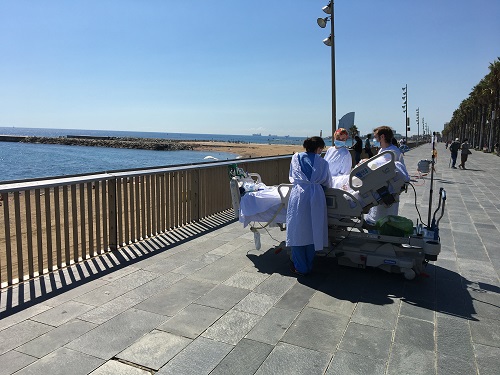
April 12th, 2023 - Press notes
The goal of the subject is to sensitize of future medical practitioners to achieve a more human physician-patient relationship, eschewing the distancing that the advancements of technology in the profession entail.
Humanism in Medicine is the new optional subject that students in their second year of the UPF and Hospital del Mar Medicine degree can take, for the first time, this third term. The subject, conceived by Manuel Pera, head of the Gastrointestinal Surgery Section at Hospital del Mar and coordinator of the Research Group on Gastroesophageal Carcinogenesis at the Hospital del Mar Medical Research Institute (IMIM-Hospital del Mar), which he himself directs with the help of Jonathan McFarland, president of The Doctor as a Humanist Association and Joaquim Gea, a professor of Physiology at the UPF Department of Medicine and Life Sciences (MELIS) and emeritus Head of Service of the Pulmonology Service at Hospital del Mar, aims to focus on the physician-patient relationship.

The course, which begins this week and will run until early June, proposes a new approach that seeks to recover the human component of the relationship between medical professionals and patients. Indeed, this component has been called into question, especially in developed countries, given the fascination with techniques and the incorporation of the latest technological advances in the consultation room.
"In surgery, we have a screen that separates us from the patient and we often forget about contact and gaze", Manuel Pera says. Therefore, if "technological progress is not accompanied by humanism, it ends up turning the medical professional into a kind of health engineer", Joaquim Gea adds.
A humanistic approach that, until now, was not being learned in medical schools. "If you were lucky you learned from a good physician, but you could also have a poor role model", Gea explains. Thus, he highlights UPF's commitment to promoting a pioneering subject in Catalan universities that goes beyond the training in ethics and bioethics taught at other universities.
As Joan Ramon Masclans, dean of the Faculty of Health and Life Sciences at the UPF and a doctor at the Hospital del Mar, explains, "this subject highlights the very motto of our studies, where medicine must be at the service of people and society, and highlights the importance of teaching empathy. It also ties in perfectly with the philosophy of the Hospital del Mar, university hospital of the UPF, where humanisation is one of the cornerstones of our health service".
The optional subject has aroused great interest among students on the bachelor's degree in Medicine, with an enrolment rate of 70%.
The subject sessions will resort to literature, language, narrative and the arts to bring out the sensitivity of future medical practitioners and address issues such as dealings with the patient and the ritual for approaching them; the balance between distancing and a lack of compassion; the importance of having a good command of language to explain the nuances of a complicated situation or the value of convalescence - increasingly threatened by the rush to discharge the patient.
All of the above will be led by a team of first-rate teachers. Some fifteen professionals from around the world including David R. Kopacz, an assistant professor with the Department of Psychiatry and Behavioral Science at the University of Washington, who will talk about the factors that lead to the loss of compassion and esteem of the physician towards their patients, and Susana Magalhaes, a researcher in medical narrative at the University of Porto, who will talk about the importance of narrative.
"Often, clinical records are a mere chronology and do not allow us to perceive how the patient is living with the disease. We only see the disease. A gastric cancer. And we forget about their uncertainties, doubts or fears", Manuel Pera explains.
As Joaquim Gea explains, nowadays, "there is a determining element of medicine that is the ageing of the population and the number of chronic diseases that we do not cure. And, when dealing with these patients, it is more important to put your hand on the patient's back while performing auscultation than all the drugs you can prescribe. Because you can't cure them. You can only mitigate the symptoms. And with that pat on the back, you're letting them know you're caring for them".
And, "in complex diseases, where many specialists are involved, seeing so many professionals makes you run the risk that the patient might lose their referents. And the patient needs the presence of the physician", Pera adds.
Thus, with this subject, the organizers envisage that students will become more aware of and sensitive to patient needs and that they will acquire the tools to be able, as Pera puts it, "to put the soul back into medicine".


 This site complies with the HONcode standard for trustworthy health information:
This site complies with the HONcode standard for trustworthy health information: Parc Salut Mar
Passeig Marítim 25-29 Barcelona 08003
See location on Google maps
Phone: 93 248 30 00 · Fax: 93 248 32 54
Information request
© 2006 - 2024 Parc de Salut Mar · Legal notice and Privacy Police | Cookie Policy | Accessibility